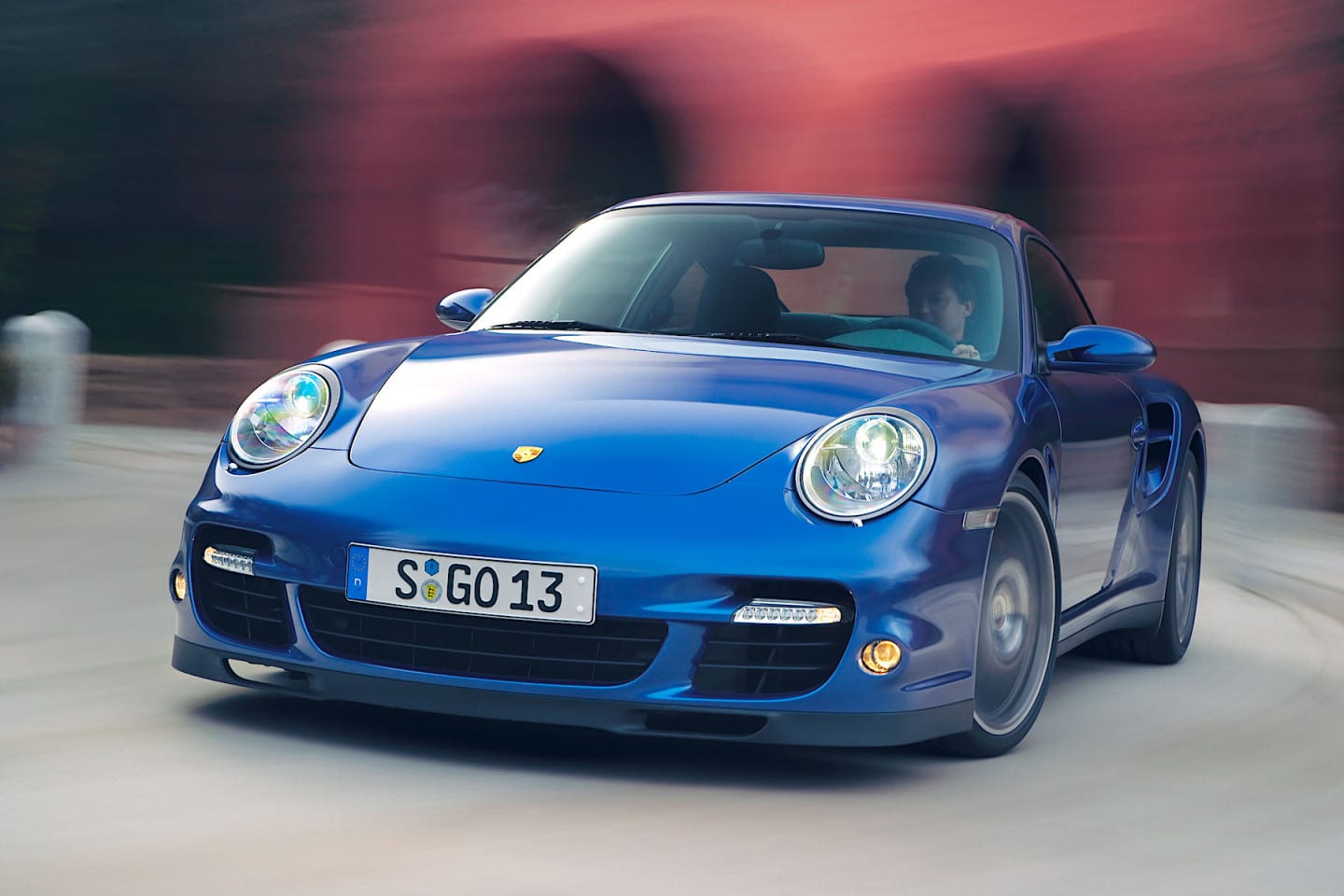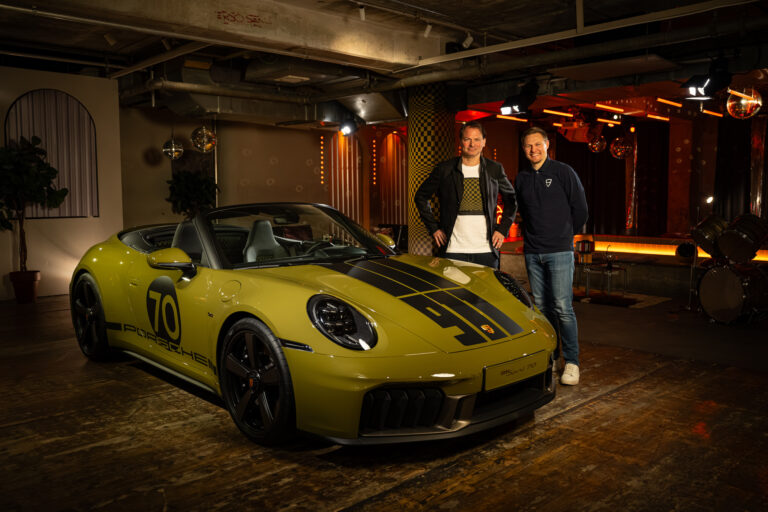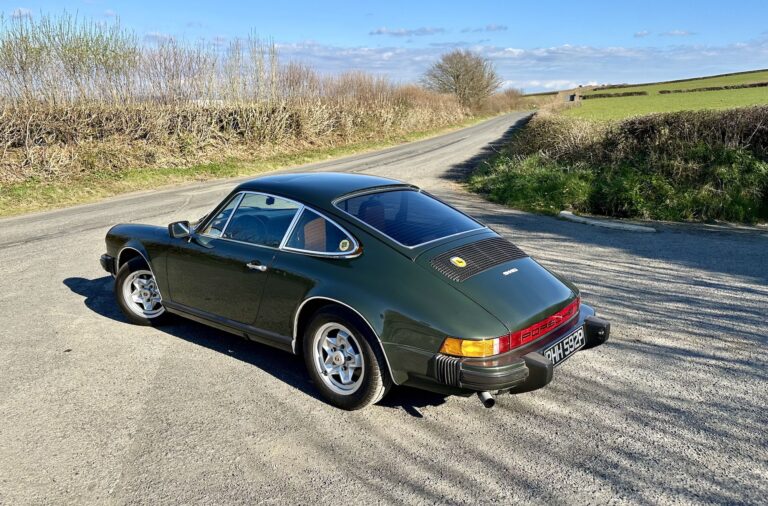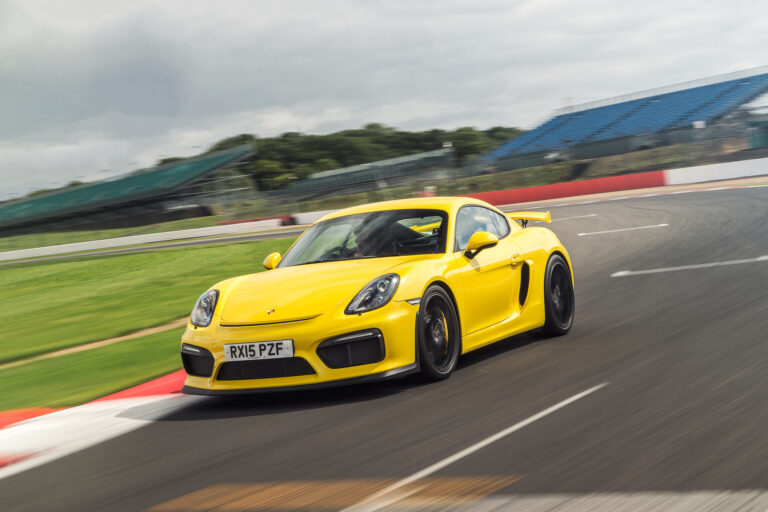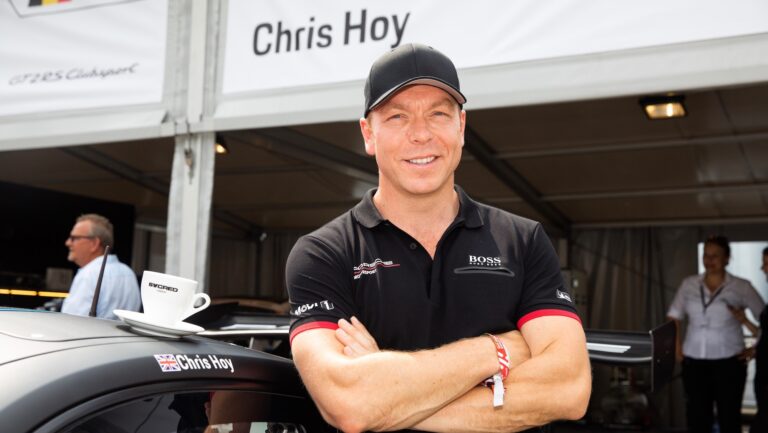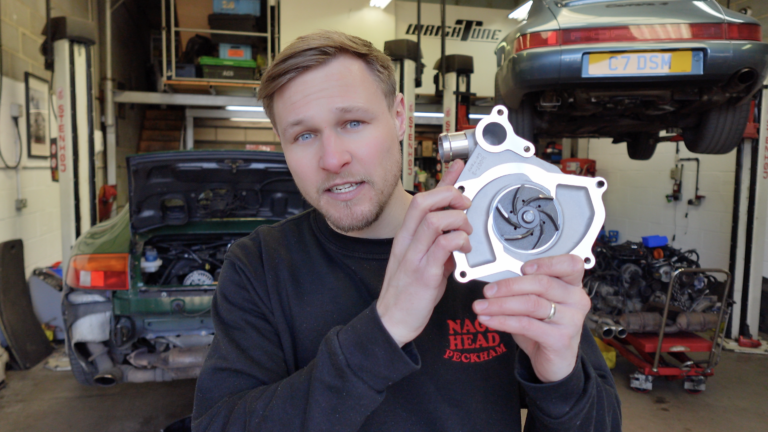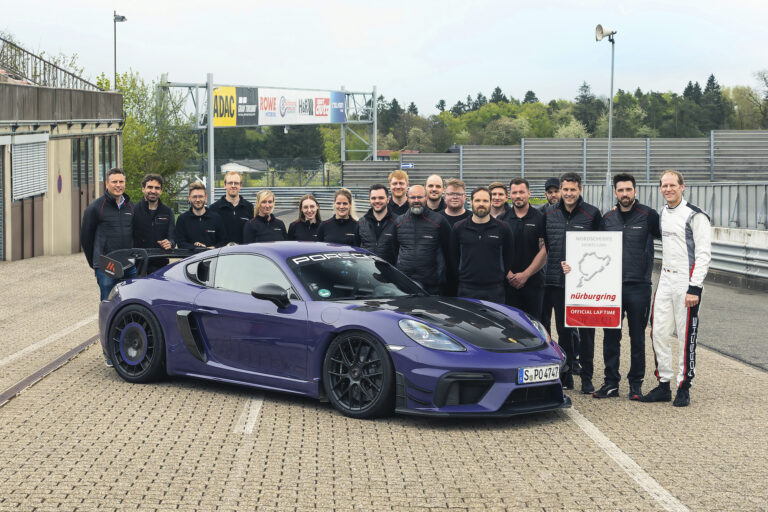 By Tim Pitt
1 year ago
By Tim Pitt
1 year ago
Porsche 997.1 Turbo buyer’s guide
Everything you need to know about buying a Porsche 997.1 Turbo, with expert advice from Jonathan Franklin Cars and Lakeside Classics
Why should you buy one?
Blurring the lines between sports car, supercar and super GT, the Porsche 997.1 Turbo (2006-2008) is an accomplished all-rounder – and surprisingly good value, too.
Porsche 997.1 Turbo: the key facts
Launched in early 2006, the 997.1 Turbo was the flagship of the Porsche 911 range until the GT2 rocketed past some 18 months later. It was also the last 911 Turbo with the famous ‘Mezger’ engine: the end of a bloodline that began with the original 930 3.0 in 1975.
The flat-six behind the back axle of the 997.1 Turbo was an evolution of the 3,600cc engine fitted to the 996 GT3 and 996 Turbo. The most noteworthy development was Porsche’s new Variable Turbine Geometry (VTG), which used electronically adjustable guide vanes to help the turbocharger spool up faster and improve airflow at high speeds – boosting both low-down torque and top-end performance.
The result was 480hp at 6,000rpm – 30hp more than even the 996 Turbo S – and a mighty 620Nm of torque from just 1,950rpm (or 679Nm on overboost with Sport Chrono). Such formidable firepower, combined with a modest kerb weight of 1,585kg, means genuine supercar performance: 0-62mph in 3.9 seconds and the potential for nearly 200mph on an empty Autobahn.
Nonetheless, this isn’t a road racer like the contemporary GT3. In accordance with Turbo tradition, it’s also luxurious, refined and effortless over long distances. Leather trim and satellite navigation were standard, with the Tiptronic auto gearbox a popular option. Chassis technology includes four-wheel drive, PASM adaptive suspension, PTM traction control and PSM electronic stability control. Few cars feel more sure-footed on slippery roads than a 997.1 Turbo; the unruly reputation of the 930 felt like a distant memory. It’s no wonder they’re always a popular search in our Marketplace.
Categories
How does the Porsche 997.1 Turbo drive?
“This is a car close to my heart,” says Jonathan from the Porsche specialist, Jonathan Franklin Cars. “I’ve owned a couple myself – one for five years and another for two years. The 997.1 Turbo is still modern enough to use every day. It’s even ULEZ-compliant, if you live in or around London. Above all, it’s just a phenomenal thing to drive; you feel like you’re wearing it.”
Henry Thomas, founder of Lakeside Classics, is equally enthusiastic: “The Gen1 997 Turbo is one of my favourite cars, and it offers some of the best value in the Porsche 911 marketplace. We know of enthusiasts who have gone back to them after owning a newer 991 or 992. It bridges the gap between eras, and feels the perfect size for driving on a British B-road.”
One could argue that the more rambunctious Mezger engine, which gives its best at high revs, is less suited to the Turbo than the direct fuel injection (DFI) motor that debuted with the 997.2 Turbo in 2009. However, nobody could find fault with the abundant thrust on offer, which builds with violent intensity as the needle sweeps past 3,000rpm. Yes, a modern 992 Turbo is quicker still, but as Jonathan points out: “On the road, anything more than about 500hp becomes irrelevant.”
This modern-classic 911 Turbo isn’t only about straight-line speed, either. The 997’s hydraulic power steering provides more lucid feedback than the CO2-saving electric systems that followed, while its suspension strikes a finely judged balance between comfort and cornering poise. You can brake hard and late, aim the relatively light nose at an apex and then use four-wheel traction – and the 911’s natural rearward weight bias – to slingshot away. While the rear-driven GT2 generates a degree of trepidation, even for very experienced drivers, the Turbo inspires only confidence.
As for changing gears, your choice is between the six-speed manual or five-speed Tiptronic S. Most buyers at the time opted for the automatic, which arguably suits the long-striding GT character of the Turbo (and is faster to 62mph than a manual), but manual cars are more sought-after today. It’s also worth noting the Tiptronic isn’t as rabidly responsive as the twin-clutch PDK introduced with the 997.2 Turbo (and still with us today). Transmission tech has come a long way since the early 2000s, but an old-school manual ’box never goes out of fashion.
Porsche 997.1 Turbo: evolution of tech
The 997.1 was essentially a thorough development of the 996 Turbo, building on that car’s strengths and ironing out some of its foibles. Its dry-sumped Mezger engine gained VTG turbocharging, combined with a lower compression ratio of 9.0:1, for a sizeable uplift in performance. Porsche’s use of aluminium for the bonnet and doors, along with carbon fibre reinforced plastic (CFRP) for the engine lid, also kept weight on a par with its predecessor.
The Turbo used the stiffer, wider body of the 911 Carrera 4, with a smooth undertray and extending rear spoiler to improve aerodynamics. Bright bi-xenon headlamps and LED indicators were standard. The Turbo Cabriolet debuted in 2007, some 70kg heavier but with identical performance figures. There was no ‘S’ version of the 997.1 Turbo. Instead, as with the 996, the Turbo S would serve as a run-out special later in the model’s life.
Little was changed during the 997.1’s fairly short time on sale. However, Porsche did introduce an update for the PCM navigation software in late 2008 for the 2009 model-year. These desirable ‘Gen1.5’ cars have the much improved PCM2 system, which offers better sat-nav, along with iPod and Bluetooth connectivity. You can recognise them by their black (rather than grey) centre console, which looks similar to the 997.2’s dashboard.
What to look for when buying a Porsche 997.1 Turbo
No car with such ferocious power and pace can be – or indeed should be – run on a budget, but Jonathan Franklin describes the 997.1 Turbo as “good value to own”. Henry from Lakeside Classics agrees it is “not a problematic car” and points out that values have risen by around £10,000 over the past two years, helping offset the costs of fuel, tax, insurance and maintenance.
Prices start from around £40,000, although both experts advise buying the best example you can afford, with a detailed service history – and steering well clear of vehicles with aftermarket modifications. The Coupe is considered more desirable than the Cabriolet, while manual cars command a premium of up to £15,000. As a guide, Jonathan Franklin Cars recently sold a manual 997.1 Turbo coupe with 24,000 miles for £75,000.
According to Henry, common problems include corrosion of the coolant pipes that run along the front crossmember, leaks from the power steering rack, and rusted front shock absorbers (most visible around the top of the piston). Air conditioning condensers are also prone to failure (check the air-con blows cold) and the front central radiator can collapse, which should be visible through the centre of the front bumper.
The Mezger engine itself is very robust, and untouched by the bore scoring issues that can affect the M97 motor in contemporary Carreras. Unfortunately, the turbocharger housing can corrode, leading to an £8,000-£10,000 bill for replacement. An established Porsche specialist, such as those listed in the 9WERKS Marketplace, can assess the engine’s condition and also provide a rev-range report, showing how often the car has hit its 6,800rpm limiter. This can also reveal the engine’s operating time, helping to verify the mileage displayed.
Another point of caution concerns the brakes. PCCB carbon-ceramics were an expensive option when new, and should last for 100,000 miles, but any cracked discs will cost £5,000 per corner to replace. For this reason, Jonathan says his preference is for a car with the (still very powerful) steel brakes.
Around 2,000 examples of the Turbo were sold in the UK – accounting for 15 percent of 997.1 production – so this isn’t an investment-grade 911 like a 997 GT3 RS or Sport Classic. Yet as a car to own and enjoy on all roads, and in all weathers, the 997.1 Turbo has few peers. Choose wisely and you won’t regret buying one.
Porsche 997.1 Turbo: the options worth having
Manual gearbox
Rarer and more desirable than the Tiptronic S automatic, particularly with the optional short-shift kit.
Sport Chrono
The familiar stopwatch atop the dashboard and an extra wallop of torque for 10 seconds on Overboost.
Sports seats
Most buyers prefer the shaplier Sports seats in the 997.1 Turbo. Seat heating and embossed Porsche crests are nice additions, too.
Updated navigation
Available on ‘Gen1.5’ cars from late 2008, the PCM2 media system offers much-improved nav and Bluetooth connectivity.
Steel brakes
A matter of personal preference, but the cost of replacing PCCB brakes can be prohibitive – and the steel stoppers are fine for road use.
Sunroof
Not a panoramic sunroof like the 991 version, although still desirable for some drivers.
Porsche 997.1 Turbo: technical spec
Years produced: 2005-2008
Numbers made: 19,201
Engine: Flat-six, 3,600cc, twin-turbocharged
Power: 480hp @ 6,000rpm
Torque: 630Nm @ 1,950-5,000rpm
Compression ratio: 9.8:1
Transmission: 6-speed manual or 5-speed Tiptronic S
Suspension
Front: Independent; MacPherson struts with coil springs and anti-roll bar
Rear: Independent; multi-link with coil springs and anti-roll bar
Wheels and tyres
Front: 8.5×19-inch; 235/35/R19
Rear: 11×19-inch; 305/30/R19
Length: 4,450mm
Width: 1,852mm
Weight: 1,585kg
0-62mph: 3.9 sec (3.7 sec Tiptronic S)
Top speed: 193mph
Want more info? Check out our comprehensive 997.1 Turbo buyer’s guide film on 9WERKS TV.
